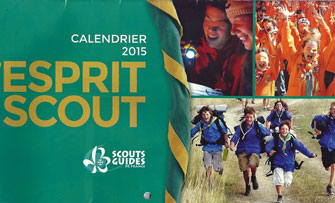
The end of the year is always a time for thoughtful reflection. A time to look back at pleasures savored and milestones achieved. And so, as 2014 draws to a close, I, like all Parisians, am thinking about one thing: 2015.
This is because, starting in about October of every year, you can’t go five minutes in Paris without someone shoving a calendar in your face. The firemen are out in the street selling their calendar (which I wrote about three years ago), the garbage collectors go door to door asking for a “tip” and handing out little calendar cards, and half of the plumbers, electricians and locksmiths in town fill everyone’s mailboxes with year-at-a-glance calendars that double as ads for their services.
I suppose there was a time when such a flood of printed matter would have been welcome. In the old days, before digital technology gave us telephones that are smarter than many of their owners, people actually needed some kind of paper thing to keep track of dates, and there was a calendar hanging on virtually every office wall, bulletin board and fridge door.
But now, in the Information Age, if you forget what day it is, all you have to do is carefully time how many minutes of daylight there are between dawn and sunset and, factoring in your exact latitude measured with a sextant, deduce the date from an astronomical chart. Or look at the nearest computer or cell phone.
Fortunately for the printing industry, along with rapid technological progress, society has also experienced moral decay. So in recent years, calendar vendors have been able to make their old-fashioned, outmoded products more appealing by using them as a flimsy (both literally and figuratively) excuse to publish titillating photos of “Hunky Fire Fighters of Vancouver,” “Sizzling Babes of the Celebrity Cricket League,” “Swingin’ Hotties of the Supreme Court,” etc., etc.
So imagine my disappointment when I bought a calendar in my local market from two Girl Scouts. Yes, the uniforms stay on. But I found it provocative in another way: since I was already in a thoughtful, reflective mood, looking through it brought back memories of my own days as a Boy Scout in the Midwestern United States some decades ago.
The French Scout calendar for 2015 is entitled “L’Esprit Scout,” and each page evokes a different aspect of the “Scout spirit.” The first one, featuring a photo of a line of Scouts in a mutual shoulder lock, is “Team Spirit”:
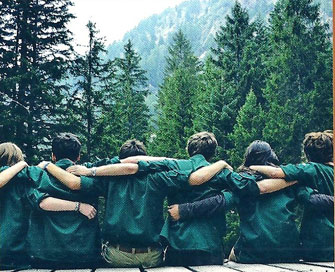
We definitely had that back in the Midwest. This is perhaps best illustrated by the behavior of my fellow troop members in the mess hall during my first year at Scout camp. Each table had eight seats, and I was assigned to one with seven older boys who all had big appetites and, worse, previous experience with the quality (frankly terrible) of the food that came out of the camp kitchen.
Most mornings we had pancakes for breakfast, and the initial serving of one apiece would be brought to the table on a single platter. Then we had to stand quietly with our heads bowed while one of the counselors read a prayer.
During this solemn, contemplative moment, my tablemates would surreptitiously reach out and flip through the stack of pancakes with one hand, hoping to find one that wasn’t too burnt (which was more difficult than it should have been).
When, finally, the “Amen” was followed by the signal to begin the meal (“Seats!”), they all would lunge at the platter with both hands, each one trying to beat the other guys to the “good” pancake. The casual observer would have taken them for refugees from a famine zone.
As a result, everyone ended up eating food that had been manhandled, or at least boyhandled, by everyone else at the table. And thus we started every day with an authentic taste of team spirit.
Thinking back on that scene, which remains to this day the second most loutish, disgusting table manners I have ever witnessed in my life (the first being from that same table that same summer, when Randy, the hungriest of the whole boorish bunch, would spit his food back onto his plate to gross us out and ruin our appetites so that no one else would want the last spoonful of scrambled eggs) (none of this, by the way, is invented or even exaggerated) made me wonder how my American Scouting experience compares with the French Scouting experience, as depicted in their calendar.
So I set out to examine the question month by month, which in this case means spirit by spirit.
Scouting in France is closely associated with Catholicism, and indeed the calendar’s next “spirit,” for December 2014, is “Spirit of Light,” with an image of a boy and girl in neckerchiefs lighting votive candles in a cathedral:
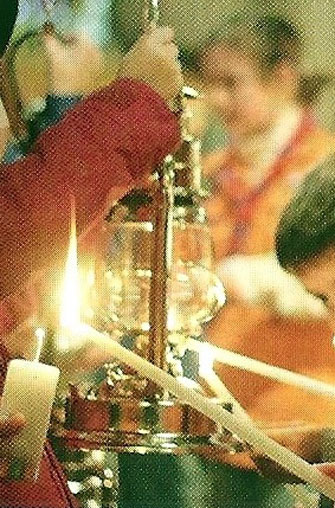
This reminded me: my troop had the spirit of light, too, but mostly what we lit was cherry bombs.
The January page, under the heading “Spirit of Freedom,” shows a Girl Scout sitting on the shore of a large body of water, gazing wistfully at the horizon, no doubt thinking about her future, her faith, her country and the betterment of mankind:
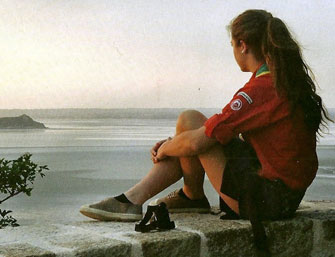
At my camp in the Middle West, we used to sit on the shore as well. Gazing wistfully at the Girl Scout camp across the lake.
For February, “Spirit of Service” shows a bunch of young Boy Scouts, under the supervision of firemen, learning about public service by spraying water from a fire hose:
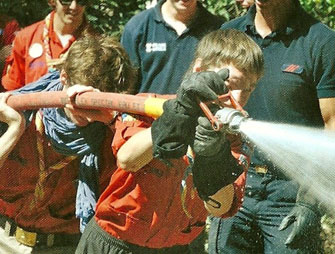
We American scouts never got to do this, and for a very good reason. If anyone had been irresponsible or insane enough to let my troop anywhere near an actual fire hose, we would have ignored the practice fire and dragged that baby over to where we could get a decent shot at Randy’s sleeping bag.
For March (the only month with no “spirit”), the French Scouts got to do something else that we never did — participate in a street demonstration:
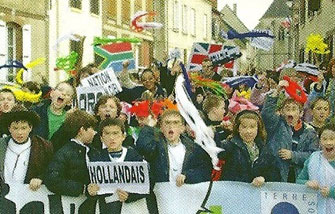
No doubt valuable training for when they grow up, get a job and immediately go on strike.
The photo for April depicts a typical activity for scouts all over the world — cooking over an open fire in the woods. Except for one small but exceedingly French difference:
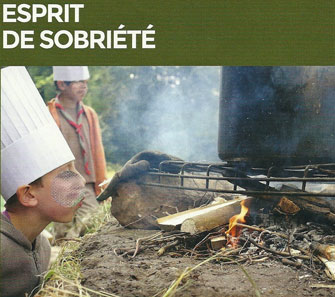
Seriously? Chef’s hats? On a campout? It makes me wonder if they also have latrine attendants handing out moist wipes and tent valets who go around putting chocolates on the air mattresses every night.
By the way, note the title here: “Spirit of Sobriety.” So I guess the kid in the background is not the wine steward.
After that the spirits keep coming:
May: “Spirit of Adventure” (with a photo of Paris traffic).
June: “Critical Spirit” (not at all surprising for France).
July-August: “Entrepreneurial Spirit” (surprisingly, for France, not accompanied by “Spirit of Confiscatory Taxation”).
September and October: spirits of “Commitment” and “Open-mindedness” (with photos of a young couple getting married and then having affairs).
November: just plain “Good Spirit.”
I don’t think anyone who knew what my fellow American Scouts and I were up to when the Scoutmaster wasn’t looking would have chosen us as poster (or calendar) children for the “Good” part. This point can best be explained in the form of two short lists:
1) Things I learned in the Boy Scouts and forgot five minutes after the badge was sewn onto my uniform:
• How to tie a sheepshank
• How to light a fire in the rain
• Which woodland plants have edible leaves
2) Things I learned in the Boy Scouts and have still not forgotten nearly 50 years later:
• How to short-sheet a bunk
• How to light a cigarette in the wind
• Which men’s magazines have cheesecake photos
Of course, all good things, and all Stag Magazine photo spreads, come to an end, and the calendar ends with “Spirit of Celebration” for December 2015. The image here is a bunch of Scouts standing around a campfire doing nothing in particular:
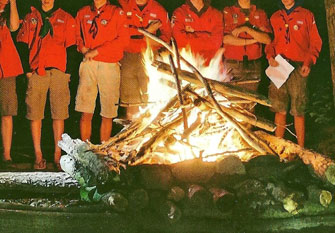
It doesn’t look like much of a fête to me, although it does compare favorably to what was considered the most exhilarating celebratory event of all at my old Scout camp: the greased watermelon contest.
Every week on visitors’ night, all the campers and their families would gather around the swimming pool to witness a game of skill and stamina that is unlikely ever to become an Olympic sport. It went like this:
Two scouts from each troop would line up around the deep end, where, at the sound of a whistle, a counselor would drop a watermelon coated in Crisco off the end of the diving board. This was the signal for all two dozen or so boys to leap into the water and thrash around furiously and more or less blindly in an attempt to gain control of the presumably coveted fruit. Whoever managed to lift it onto the deck of the pool won the prize.
And the prize was: the watermelon. In other words, the game involved a faint risk of drowning and a distinct risk of getting kneed in the family kumquats, all for a slim chance of winning one of the cheapest and least flavorful food products on earth. Which you then had to share with your troop.
I never could understand why this was supposed to be such a fabulous treat. And I understood it even less the one year when a kid from my troop won the contest.
A watermelon is never really a delicacy, and by the time we got the thing degreased (no fun) and cut up into small enough chunks to go around, it wasn’t very tempting at all.
Especially after Randy had sifted through all the pieces, looking for the one with the most seeds. So he could spit them at us.
Note to readers: Paris Update will take a two-week break for the year-end holidays. I’ll be back in January with more of whatever it is that you call this. Certainly not responsible journalism.
© 2014 Paris Update
FavoriteAn album of David Jaggard’s comic compositions is now available for streaming on Spotify and Apple Music, for purchase (whole or track by track) on iTunes and Amazon, and on every other music downloading service in the known universe, under the title “Totally Unrelated.”
Note to readers: David Jaggard’s e-book Quorum of One: Satire 1998-2011 is available from Amazon as well as iTunes, iBookstore, Nook, Reader Store, Kobo, Copia and many other distributors.
